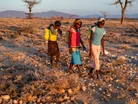McKinsey: Healthcare Must Adapt to Climate Change Perils

- Managing the threats posed by climate change to human health requires a rapid upscaling of adaptation interventions.
- Scale medical products and technologies that seek to reduce the burden of climate change on health
- Create health-related climate surveillance, early-warning, and response systems
- Create climate-resilient healthcare infrastructure, supply chain, and workforce capabilities
- Drive local research and innovation and offer support for more-targeted product development
Solutions to help healthcare meet the threats posed by climate change are “immature”, according to a new report from McKinsey, who says scaling sustainability solutions is “critical for protecting vulnerable populations”.
McKinsey says the 2023 UN Climate Change Conference (COP28) marked a shift in focus towards the connection between climate change and human health.
The report says adaptation “is a key imperative in climate and health”, and points to the fact the World Health Organisation has identified climate change as "the greatest threat to global health in the 21st century".
It adds that there is an “urgent need” to protect vulnerable populations – including women, children, the elderly, low-income earners, Indigenous and migrant groups and those in lower-income countries.
McKinsey suggests that health sectors should consider scaling existing programmes to manage those risks exacerbated by climate change. It says increasing vaccination efforts against cholera in areas with heightened flood risk is one example.
Healthcare funding shortfall 'of up to £45mn'
The report says healthcare leaders face a difficult task, because the estimated annual shortfall of investment in adapting in health systems is estimated to be between £21-£45 billion. McKinsey argues that creating change at this scale is likely to require new policy and financing models.
It identifies potential solutions, including:
- Prioritising areas for impactful and equitable innovations
- Deploying promising solutions drawn from the Health Innovation Exchange's (HIEx) global call for climate and health innovations. HIEx is an international platform that supports innovation ecosystems for climate resilience and improved access to healthcare.
McKinsey adds that climate risks can affect a wide range of health conditions, both directly and indirectly. The report notes these risks can impact health systems' ability to provide care due to effects on infrastructure, value chains, and workers. It emphasises that the nature of risks and outcomes will vary widely by locality, dependent on localised exposure and vulnerability factors.
It goes on to note that 120 countries endorsed the COP28 Declaration on Climate and Health, with £1bn in funding committed to address the issue.
McKinsey says that the topic is expected to remain prominent at the 2024 G20 summit in Brazil and subsequent COP events in Azerbaijan and Brazil. These meetings will centre on climate-finance goals and nationally determined contributions.




